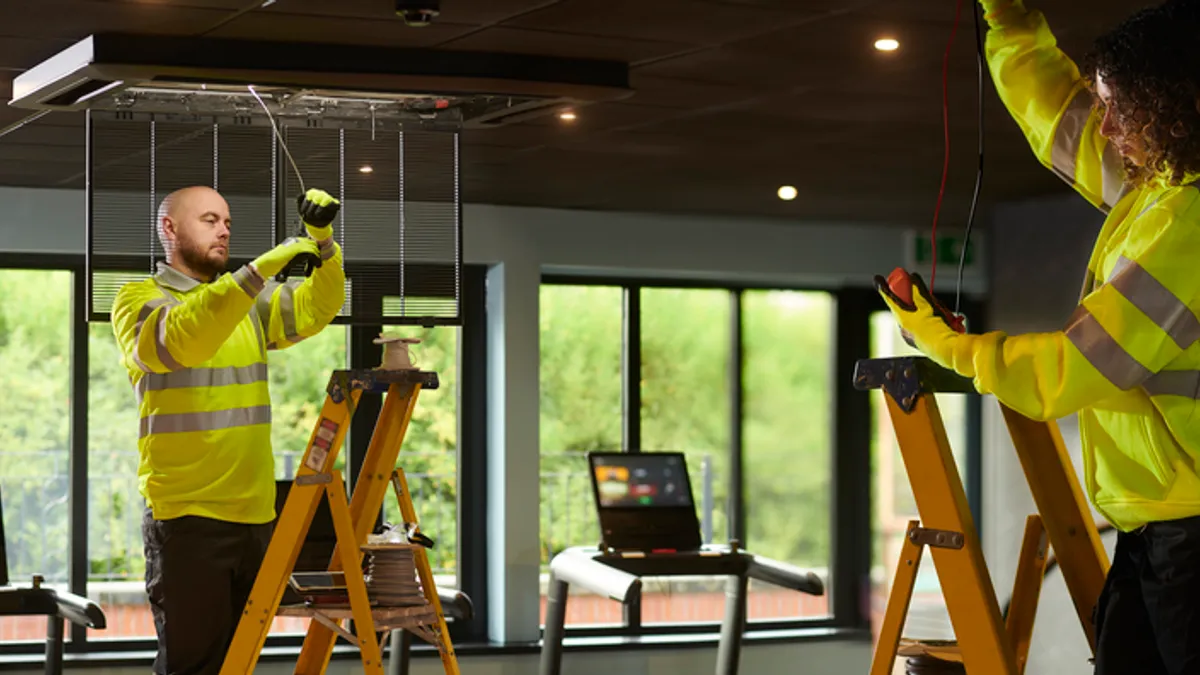Dive Brief:
- A bipartisan coalition of 25 governors organized as the U.S. Climate Alliance on Thursday committed to increase heat pump installations across their states to 20 million by the end of the decade.
- The group said it will work to advance policies that “ensure new buildings lead the way to achieve long-term decarbonization goals,” including supporting zero-emission building codes and standards and accelerating retrofits in existing homes and businesses.
- More than a dozen businesses including heat pump manufacturers signed a letter supporting the governors’ commitments. “By joining together on multi-state building decarbonization strategies, states can benefit from collaboration and greater access to research and model program designs,” they wrote.
Dive Insight:
The commitment to quadruple U.S. heat pumps is “encouraging” and will bring the states “within reach of the deployment needed to hit U.S. climate targets,” according to RMI. However, achieving the 20 million target will require a broad and comprehensive effort, the climate-focused nonprofit said.
There are about 4.8 million heat pumps installed across the U.S., according to RMI. They will be a key technology to achieving President Joe Biden’s clean energy goals, which include the U.S. reducing climate pollution by 50-52% by 2030, relative to 2005 levels.
Emissions from buildings account for more than 30% of all U.S. greenhouse gas emissions, according to the governors’ climate alliance.
For the states to achieve their heat pump targets in a “timely and equitable manner” they will need to “develop complementary building decarbonization policies,” RMI experts wrote in a blog post. “The most immediate step is for states to leverage new federal [Inflation Reduction Act] funding to help low- and moderate-income homes upgrade and electrify.”
The coalition of governors said it intends to maximize the use of federal incentives, including those included in the IRA and the Infrastructure Investment and Jobs Act, to expand the use of heat pumps.
“There’s a lot of power in this. When you represent 60% of the country’s economy you can have a real, broad-based impact,” New York Gov. Kathy Hochul, D, said at a Climate Week NYC event to announce the heat pump commitment.
The coalition of states also represents more than half of the U.S. population. The group said it will “prioritize equity” to ensure at least 40% of the benefits from building decarbonization are experienced in disadvantaged communities, and tackle workforce shortages to support the clean energy transition.
“These bold commitments by governors to cut emissions from buildings will have a catalytic impact across America,” White House National Climate Advisor Ali Zaidi said in a statement. Expanding the use of heat pumps can “strengthen America’s climate resilience, and create good-paying jobs in every corner of the country.”
The building sector “plays a major role in overall public health,” more than a dozen businesses wrote to the climate alliance in support of the governors’ heat pump commitment. Businesses signing the letter include Johnson Controls, Schneider Electric and Siemens.
“This is a crucial moment for states to strengthen their commitments to achieving building decarbonization,” the businesses wrote. States will soon be updating climate action plans using funds from the Inflation Reduction Act and “we see this as a key opportunity” to identify high-priority policies, they said.
The Environmental Protection Agency on Wednesday announced that states and local governments can now apply for a total of $4.6 billion in competitive grants to implement climate action plans.
Energy-efficient heat pumps are increasingly embraced by consumers. Last year, U.S. residential heat pump sales exceeded gas furnaces for the first time, making up 53% of heating system sales.















